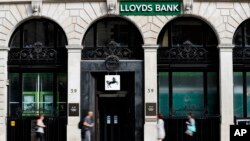The results of recent stress tests of Europe's biggest banks should have reassured investors that the sector can withstand another crisis. A slump in share prices across the industry since the findings' publication on Friday suggests many have yet to be convinced.
On Tuesday, bank stocks across Europe - even those that were effectively given a clean bill of health by the European Banking Authority's tests - fell sharply for the second day and weighed heavily on the wider market indexes.
The falls aren't just confined to Italy, where concerns over the health of the banking sector have been the most acute. Britain's Barclays fell 3.6 percent while Germany's Commerzbank slid 9.2 percent and Italy's UniCredit dropped another 7.2 percent.
As a result, the main indexes in Europe fell sharply - both Germany's DAX and France's CAC-40 closed down 1.8 percent.
It's difficult to pin down a single reason why European banking stocks have taken such a battering this week. After all, Friday's stress tests into Europe's 51 biggest banks showed that only Italian bank Monte dei Paschi di Siena, or MPS, was severely underfunded.
Michael Hewson, chief market analyst at CMC Markets in London, says the tests' findings failed to address many of the concerns investors have about the state of Europe's banks, including the rising costs they face for parking their cash at the European Central Bank.
The ECB has in recent months been reducing its so-called deposit rate further below zero in the hope that banks opt to lend money rather than place it at the ECB. That rate is now minus 0.4 percent and many economists think it could be cut further in coming months as the ECB tries to encourage lending.
“Skepticism that the EBA bank stress tests painted a far too rosy picture of the health of Europe's banks while paying no account of the current negative rate environment nor for that matter the fiscal health of Portuguese and Greek banks,” Hewson said.
No banks from Portugal or Greece were assessed in the stress tests. And they are two countries still struggling with high debts and low growth, a backdrop that makes their banks susceptible to a new financial or economic crisis. Throughout Europe's debt crisis, it was clear that problems in one country can easily spill over to another.
One country that saw a number of its banks assessed Friday was Italy.
Italian banks have been worn down by some 360 billion euros ($400 billion) in loans that won't be paid back in full as a result of years of crisis and subdued growth that's made it difficult for firms and households to service their debts. The scale of the non-performing loans stands a little below 20 percent of the banks' total loan stock, a level that weighs on their propensity and ability to lend.
Given Italy's position as the eurozone's third-largest economy, any major financial problems that put in doubt the state's own finances would create a new crisis for the currency bloc that could outweigh those of the past few years, notably in Greece.
MPS, Italy's third-biggest lender, sought to get ahead of its poor result in the stress tests with a plan to offload a large chunk of its soured loans at a certain discount and a 5 billion euro ($5.6 billion) capital increase. The money injection from private sources avoids a potentially painful bailout for the Italian bank that under new EU rules would have imposed losses on creditors like bondholders, many of which are small savers in Italy.
Though welcome, MPS' cash call has stoked expectations that other banks may have to do something similar and that has contributed to the wave of selling in stock markets this year, notably of Italian banks.
“It's likely that the weakness in Italian banks in particular may be down to renewed fears that more recaps are needed in the sector,” said Jim Reid a senior analyst at Deutsche Bank.
A related concern is that Italy's banks won't address their problems, partly because of the country's legal system, which makes foreclosure agreements far lengthier than elsewhere in Europe.
And though the Italian government has acknowledged the fragility of the banking system and introduced some modest reforms and legal changes, it may find it difficult to push the banks to shore up their finances given the new EU rules and the potential impact on savers. That's even more unappetizing for the government as it prepares for a referendum on political reforms and a possible election soon after.
As a result, the banks could just continue to stumble on, further hobbling an economy that's barely grown in years.
“The real turning point for Italian banks will be when markets acknowledge that the stock of bad debts, also helped by the recent government initiatives, is on a downward trend and the banking system back in supporting the real economy,” said Nicola Nobile, senior eurozone economist at Oxford Economics.
Bank stocks have been under pressure for months, some more so than others. That was evident in the news that Deutsche Bank and Credit Suisse have been dropped from the Stoxx 50 index of leading European shares in the wake of their sharp share price falls over the past year. Both have seen their market values slump by around two-thirds over that time.
The two stocks fell further Tuesday as their departure from the index means that funds that track top indexes readjust their investments. Deutsche Bank fell a further 4.8 percent, while Credit Suisse slumped 5.9 percent.




